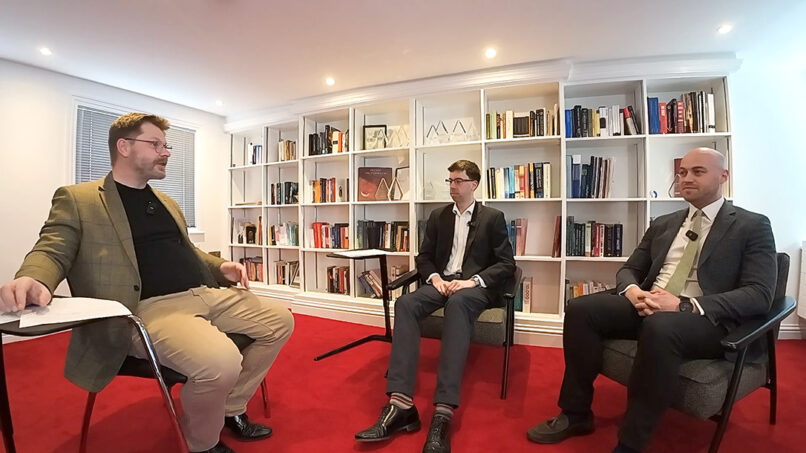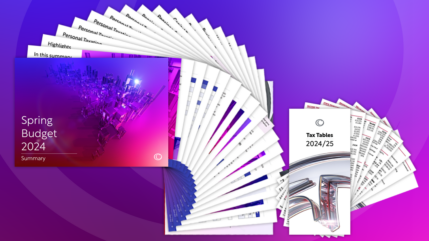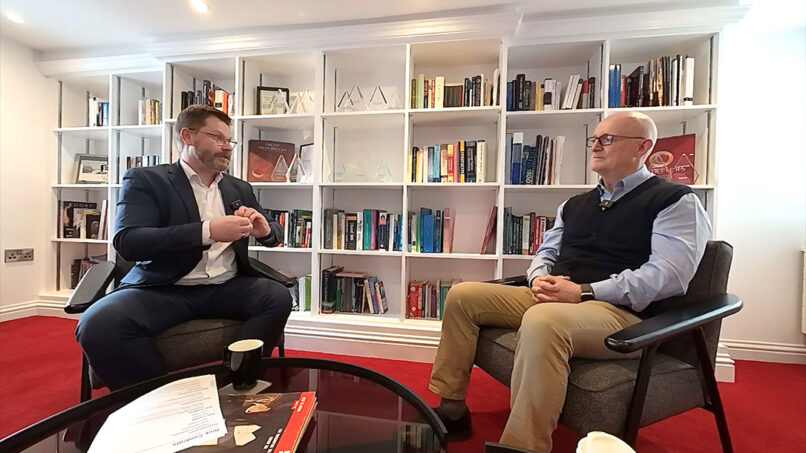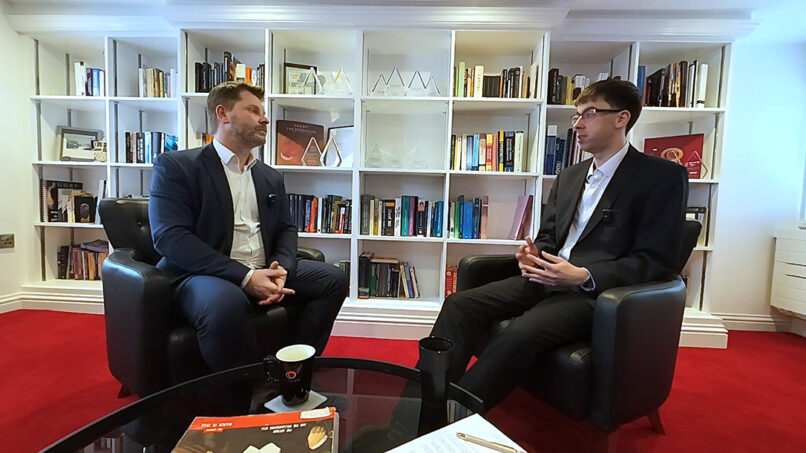Private Client Team
Robert Smith, Private Client Manager

As far as Courtiers clients are concerned, the big news from today’s Autumn Statement is much as expected and focuses on reduced National Insurance, State Pension Increases and reduction in Taxes on Businesses. There are no changes to Inheritance Tax (IHT) which until yesterday was widely predicted.
Jeremy Hunt hailed it as his Autumn Statement for Growth, and he hopes this will bring tens of thousands more people back into work. He said the UK is “a country that has turned a corner” which also feels like a timely step in the right direction to put more into every household’s income pot and the start of the Election Campaign!
The headlines for our personal finances were:
State Pension
Triple Lock to be maintained in full giving an 8.5% rise in State Pensions from April 2024. Jeremy Hunt said, “That is one of the largest ever cash increases to the State Pension.”
National Insurance
The rate paid by employees is being cut to 10% from 12% starting from 6th January 2024, saving someone earning £35,000 per year around £450 a year and changes to Self Employed rates which the Chancellor described as “saving an average of £350 per year from April”.
Other points of note were increases to the Minimum Wage and Benefits, and one to keep an eye on was that the Chancellor said he will consult on giving pension savers a legal right to require new employers to make new contributions into the individual’s existing pension scheme.
One slight sting in the tail was that the Office for Budget Responsibility (OBR), off the back of stubborn inflation and interest rates, revised its Forecast to predict slower (but still positive) growth over the next four years.
Final thoughts
There are always two sides to the coin and whilst there is no doubt these changes will increase our “pay packets” let’s not lose sight of the previous changes announced 12 months ago and in the Spring Budget earlier this year, which cut Dividend and Capital Gains allowances and froze the personal allowance.
Corporate Services Team
Tobias Hancock, Trainee Adviser
 Jeremy Hunt started this year’s Autumn Statement with a bang by informing the nation that the government will “honour its commitment” to the triple lock and increase the new state pension by 8.5% in April 2024. This will provide pensioners with a much-welcomed boost during a period of high inflation.
Jeremy Hunt started this year’s Autumn Statement with a bang by informing the nation that the government will “honour its commitment” to the triple lock and increase the new state pension by 8.5% in April 2024. This will provide pensioners with a much-welcomed boost during a period of high inflation.
Rather than being automatically enrolled into a pension scheme of their employer’s choosing, the Chancellor is looking to give employees the opportunity to nominate the pension into which they and their employers contribute. With this it is hoped that individuals can then build a “pot for life” into which all their pension savings are invested.
The Government hopes this will greatly simplify the arduous administration of maintaining multiple pension pots for individuals. This could however be a disadvantage for some, as one of the major benefits of the current pension position is that employers have default pension options in place which minimises the complexity and effort that comes with making pension decisions, when you join a new company, to build a pot for retirement.
A number of factors have to be considered when choosing a suitable pension fund and with the introduction of the “pot for life” there is a concern that employees may not choose an arrangement that is suitable for their goals and objectives. The devil is however always in the detail, so we look forward to seeing how this proposal develops.
The Chancellor also announced that from January 6th type 1 National Insurance (NI) will be cut from 12% to 10% to sweeten the electorate for 2024.
Investment Team
Jacob Reynolds, Head of Asset Management
 Jeremy Hunt continued his reputation as a safe pair of hands with currency, bond and equity markets unchanged by his Autumn Statement. The chancellor was shipped in post the Truss-Kwarteng budget in September 2022 that sent interest rates up and crashed the pound. A year on, interest rates are still higher than they were a year ago, but the pound has rebounded 17%.
Jeremy Hunt continued his reputation as a safe pair of hands with currency, bond and equity markets unchanged by his Autumn Statement. The chancellor was shipped in post the Truss-Kwarteng budget in September 2022 that sent interest rates up and crashed the pound. A year on, interest rates are still higher than they were a year ago, but the pound has rebounded 17%.
Full expensing of business investment was made permanent, a policy that the Adam Smith Institute called “the best idea in politics” in 2017. This was initially a temporary measure introduced in March 2023 but as Milton Friedman would say, “nothing is so permanent as a temporary government program”. Fortunately, this is sticking around for positive reasons. The UK has struggled to lift business investment since the Brexit vote in 2016 but the OBR announced in September that business investment was up 9.4% compared with a year earlier.
Finally, the chancellor announced a retail sale of Natwest shares that were purchased during the Global Financial Crisis. The government has been decreasing their stake since 2015 but still owns 40% of Natwest valued at over £7 billion. The government also had a stake in Lloyds but they were able to sell the remainder of their stake in 2017.
Gary Reynolds, Chief Investment Officer

When Chancellor Jeremy Hunt kicked-off his Autumn Budget by stating that he was not in favour of big government, high spending and high taxes you got an idea of what was coming i.e. trim the state and cut the taxes used to fund it. This is the Conservative party setting the battleground for a General Election that will almost certainly take place towards the end of next year.
To avoid making the same mistake as his predecessor, Kwasi Kwarteng, in his now infamous September 2022 statement, Hunt was careful to let everyone know that the outcomes of each and every measure had been carefully scrutinised by the Office for Budget Responsibility (OBR).
The Chancellor and Prime Minister had cause to be confident. They had promised to halve inflation when they took office, which at that time was 11.1%, and they can claim victory because UK inflation is now 4.6%. In truth this was a bit of a gimmick because as I said when this pledge was made, they were setting a low bar. Global inflation was declining and all the Government needed to do was to make sure that the Bank of England didn’t re-stoke the fires of price rises, as they had done through massive Quantitative Easing (QE) in the summer of 2020.
The fiscal position is a lot better compared to the OBR’s spring forecasts, which provided a platform for the Chancellor to announce a plethora of tax reductions benefiting the self-employed, companies and employees through the abolition of Class 2 NI (paid at £3.45 per week by the self-employed), the reduction in Class 4 NI (also paid by the self-employed) from 9% to 8%, a reduction in employee NI from 12% to 10% and confirmation that the super deduction for corporation tax, introduced in 2021, would be permanent. The latter allows companies to fully expense the cost of business investment in the year in which it was made. It is particularly welcome because it creates a more certain environment in which companies can invest and the OBR says it will raise annual investment by circa £3 billion per annum. Bearing in mind that improvements to UK productivity have flatlined since the global financial crisis, anything that reverses that trend is to be welcomed.
Aside from some bold tax reductions, the biggest take away for me is that Jeremy Hunt’s speech and fiscal measures were reminiscent of more normal political times when ministers concentrated on the details of policy changes, rather than populist ideology which was the hallmark of the Johnson era. This, together with an opposition that is similarly more focused on the detail, is refreshing.
A comprehensive summary of the Autumn Statement will be published tomorrow.













